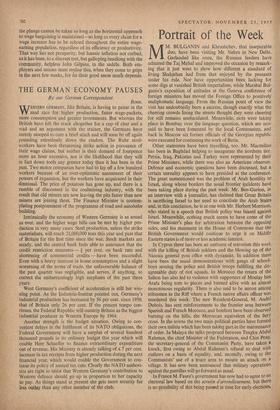THE GERMAN ECONOMY PAUSES
By our German Correspondent Bonn. WESTERN GERMANY, like Britain, is having to pause in the mad race for higher production, fatter wage-packets, more consumption and greater investments. But whereas the British have left the track altogether for a cup of char and a wad and an argument with the trainer, the Germans have merely stooped to cure a brief stitch and will soon be off again pounding relentlessly down the cinders. The Ruhr steel- workers have been threatening strike action in pursuance of their wage claims, but neither is their demand of fourpence more an hour excessive, nor is the likelihood that they will in fact down tools any greater today than it has been in the past. Two motor companies have had to lay off a few hundred workers because of an over-optimistic assessment of their powers of expansion, but the workers have acquiesced in their dismissal. The price of potatoes has gone up, and there is a rumble of discontent in the coalmining industry, with the result that old miners are now leaving the piti faster than new miners are joining them. The Finance Minister is contem- plating postponement of the programme of road and autobahn building.
Intrinsically the economy of Western Germany is as sound as ever, and the higher wage bills can be met by higher pro- duction in very many cases. Steel production, unless the strike materialises, will reach 21,000,000 tons this year and pass that of Britain for the first time since the war. Stock markets are steady, and the central bank feels able to announce that the credit restriction measures — per cent. on bank rate and shortening of commercial credits have been successful. Even with a heavy increase in home consumption and a slight worsening of the terms of trade, the unfavourable balance of the past quarter was negligible, and serves, if anything, to correct the embarrassingly high surpluses of the past three years.
West Germany's coefficient of acceleration is still her win- ning point. As the Industrie-Institut pointed out, Germany's industrial production has increased by 56 per cent. since 1950, that of Britain only 26 per cent. If the present tempo con- tinues, the Federal Republic will outstrip Britain as the biggest industrial producer in Western Europe by 1964.
Another strength is the budget situation. Giving to con- venient delays in the fulfilment of its NATO obligations, the 'Federal Government will have a surplus of several hundred thousand pounds in its ordinary budget this year which will enable Herr Schaeffer to finance extraordinary expenditure out of revenue. His Ministry is already talking of a 7 per cent. increase in tax receipts from higher production during the next financial year, which would enable the Government to con- tinue its policy of annual tax cuts. Clearly the NATO authori- ties are right to insist that Western Germany's contribution to Western defence should go up in proportion to her capacity to pay. As things stand at present she gets more security for less outlay than any other member of the club.


























































 Previous page
Previous page